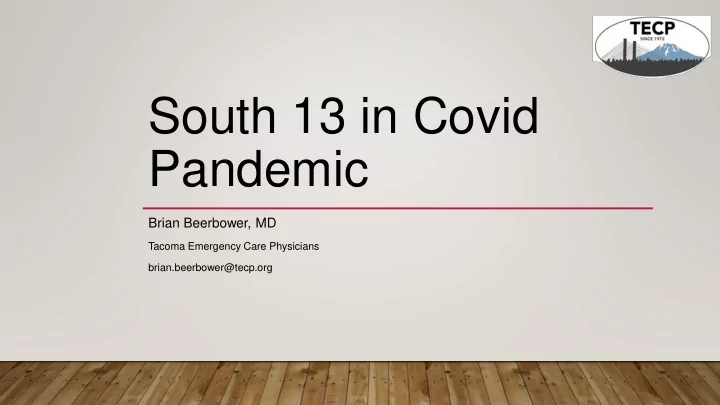

South 13 in Covid Pandemic Brian Beerbower, MD Tacoma Emergency Care Physicians brian.beerbower@tecp.org
Background • Grew up in Porter,WA (unincorporated Grays Harbor County) • PLU Class of 2010 • Medical College of Wisconsin Class of 2014 • University of Massachusetts Emergency Medicine Residency Class of 2017 • JoinedTECP 2017 in Tacoma covering Tacoma General Hospital, Allenmore Hospital, and Covington Medical Center
Case Presentation • Chief complaint • History of Present Illness • Review of Systems • Physical Exam • Assessment/Plan
Case: 91 Female presenting with cough • CC: cough • Triage note: 91 F coming from facility with AMS (altered mental status) and cough • HPI: History obtained by EMS due to patient confusion • 91 F hx of Alzheimer’s disease with baseline non verbal status, presenting from facility with cough, worsening confusion, and unwillingness to eat. Facility states symptoms for three days. Family notified by facility and en route. POLST arrives with patient. • Review of systems: Unable due to mental status (typically reviews by organ system- think the checkbox form you fill out at the doctor’s office)
Exam General • VITAL SIGNS • Head Heart Rate: 125 • ENT Respiratory Rate: 35 • Neck Blood Pressure: 90/55 • Cardiovascular Oxygen Saturation: 88% room air Lung • Temperature: 95.8 F • Extremities • Neuro • Psychiatric • Skin
Exam VITAL SIGNS General: appears stated age, critically ill appearing, • • Head: atraumatic Heart Rate: 125 Respiratory Rate: 35 • ENT: mucous membranes dry, trachea midline Blood Pressure: 90/55 • Neck: No venous distension, moves neck freely Oxygen Saturation: 88% room air • Cardiovascular: tachycardic, systolic murmur heard Temperature: 95.8 F Lung: tachypneic with poor effort, crackles in bases, poor air movement • • Neuro: opens eyes sponteanously, moves to pain, incomprehensible sounds. Does not move R leg • Psychiatric: intermittently agitated, difficult to assess due to mental status/confusion • Skin: right foot cold to the touch with blackening appearance of toes • Extremities/pulses: absent pulses right foot and popliteal
DIFFERENTIAL DIAGNOSIS • Pneumonia, Covid-19, congestive heart failure exacerbation, sepsis, urinary tract infection, acute limb ischemia, rhabdomyolysis, cellulitis, necrotizing soft tissue infection
Initial steps • Diagnostics: blood tests, urine, chest x-ray, bedside ultrasound right leg • Therapeutics: IV fluids, antibiotics
Decision Trees
DecisionTrees • Sick or not sick? • Diagnostics necessary? • Admit or discharge? • Assess aggressiveness of care
ACUTE LIMB ISCHEMIA
Case wrap up • Daughter presented within 15 minutes of patient arrival • Notified of the critical nature of mother’s presentation. Discuss therapeutics necessary with advanced stage of limb ischemia. Now showing signs of systemic (whole body) disease as response. Is actively dying- how aggressive or invasive should we be in the case? • Daughter chooses to focus on comfort. Admission orders placed • Delay in admission 2/2 covid precautions, visitor restrictions
Case wrap up • Patient ultimately passed 12 hours later. Daughter able to be at bedside for duration of mothers life including the time of her death
POLST • Physician Orders for Life Sustaining Treatment • Includes: • Patient wishes for resuscitation (Full, Partial, Comfort Measures Only) • Medical interventions • Antibiotics • Artificial feedings
Reflections • Sometimes the best part of my job is not saving a life, but rather to allow someone to die • Giving permission to families and attempt to reduce the guilt involved with grieving process
Impact of COVID-19 Precautions on Accelerated Dementia in Geriatric Patients • Original topic • Lack of interaction from families, friends, communal dining and events leads to increased depression and ultimately increased memory challenges among geriatric patients • More of a research project/paper hypothesis is all experiential • Some of my discussion was quite cynical- something I have to fight on a daily basis
Other Covid-19 musings/considerations • Professional: Fear, anxiety, guilt • Business: furloughs, mandatory reduction of hours, sick leave, responsibility to others • Rural areas: lack of high speed internet affecting communities
Vocational thoughts • What I enjoy about what I do • What I have challenges with • PLU preparation- marathon training
Thank You • Brian.beerbower@tecp.org
Recommend
More recommend